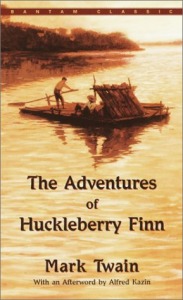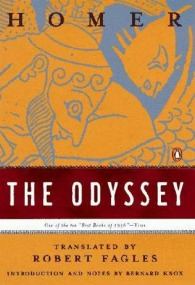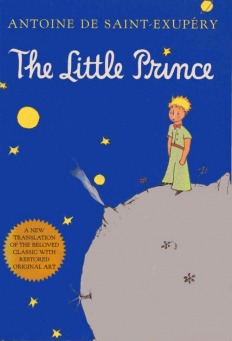Course Literature.
The Adventures of Huckleberry Finn

With such a dense and enriching novel, it would be difficult NOT to find examples of serendipity. Huck Finn creates a friendship that lasts throughout the story with Jim, a runaway slave from his aunt's own farm. To escape his abusive father and the town he has come to despise, Huck fakes his own death and canoes over to Jackson's island. Coincidentally, he meets Jim on the island who is also taking refuge from being sold. This meeting allows them to pool in their survival techniques and plan a way to keep safe in ways one man could not.
Farther along in the book, Huck goes after Jim who has been captured. As he arrives at the house, still not sure what he is going to do or say to get him back, the owners run out happy to see their arriving nephew. Huck goes along with it, and he soon finds out the nephew he is playing is named Tom Sawyer, his best friend. Miles south of his home, he finds himself in a situation where if he doesn't spit out information about his siblings and his parents he will be discovered within minutes. By pure chance, he is disguised as the one person he knows everything about.
Jim is a character full of knowledge and belief in superstitions. Throughout the book, he categorizes symbols of bad and good luck. He blames much of their misfortune/fortune on the symbols that impact their lives.
Farther along in the book, Huck goes after Jim who has been captured. As he arrives at the house, still not sure what he is going to do or say to get him back, the owners run out happy to see their arriving nephew. Huck goes along with it, and he soon finds out the nephew he is playing is named Tom Sawyer, his best friend. Miles south of his home, he finds himself in a situation where if he doesn't spit out information about his siblings and his parents he will be discovered within minutes. By pure chance, he is disguised as the one person he knows everything about.
Jim is a character full of knowledge and belief in superstitions. Throughout the book, he categorizes symbols of bad and good luck. He blames much of their misfortune/fortune on the symbols that impact their lives.
http://students.hthma.hightechhigh.org/~gcalpito/11thgrade/5102XMBCE5L.jpg
Siddarthah.

The story of Siddhartha is one of many learning experiences, or paths taken, that lead Siddhartha toward the moment he reaches his ultimate goal. Among the numerous encounters, defeats, and challenges Siddhartha faces along his journey toward enlightenment, an obvious presence of serendipity is displayed in the tale. As Siddhartha sets out on his expedition alongside Govinda, we can all recall their separation at the Buddah's camp. More importantly, however, is the few times the two friends cross paths; a perfect declaration of serendipity. The birth and preliminary encounter of Siddhartha and his son is another serendipitous event present in the novel. The immediate image of Siddarthah perched alongside the river leaning against a tree, as he contemplated his life and all of it's negatives toward suicide, immediately pops into our heads. When Kamala stumbled upon him at the ferryman's river, the immediate affection Siddhartha felt toward his son was the perfect remedy to aid him out of his current depressed state. These serendipitous events throughout the story are part of the driving force behind Siddhartha's success along his trek toward salvation.
http://anatomylesson.files.wordpress.com/2008/08/siddhartha-book-cover.jpg
The Odyssey.

Through our studies of Greek literature, particularly the Odyssey in 10P, we have learned how large a role the gods played in the Greek's lives and belief system. Homer's epic puts our hero, Odysseus, in countless life or death situations. In one way or another, Odysseus was always successful in finding a way out of whatever trap he was put in, eventually landing him upon the Ithaca's shore. A common reoccurrence throughout the tale was the appearance of the goddess of wisdom - Athena. She took on the role as Odysseus's guide through his eventful journey home. Often appearing in disguise to his aid, she found ways to contribute to Odysseus's success story. The Greek culture respected and commanded the Gods and their beneficial contributions, and explained Odysseus's triumphs as fate. Today, however, how would we interpret all of the hero's successes? It is true that today too, fate would be a reasonable interpretation, yet, this is not part of our culture. It is expected that people would too, find other justifications for Odysseus's ways. Serendipity, a series of fortunate accidents, would most definitely be one rationale.
http://routeduvin.typepad.com/photos/bookcovers/img004.jpg
The Little Prince.

The Little Prince is a true testament of how people we meet in our lives can effect the way we view the world. Beginning the story we see a pilot who crashed in a remote desert without proper necessities and any knowledge as to how to fix his plane and return home. With all of these difficulties presenting themselves, it is hard to believe that it would be here where he would meet a person that he would continue to reflect upon for the rest of his life, the little prince. Their meeting provided the pilot with the ability to appreciate his old way of thinking, along with how his views have evolved throughout his life. Nevertheless,the pilot was not the only one who serendipitously came upon a person that had a major impact on their life. During the little prince's journey he crossed paths with a fox who taught him what makes the people in our lives more special than anyone else. In the little prince's case, his rose. Although there were hundreds of "identical" roses in the world, the little prince's rose was special because hey were tamed to each other, or in other words, they shared a special connection. These random meetings, which do not always appear significant , are what sometimes lead us to the greatest discoveries.
http://redodysseyreflections.files.wordpress.com/2009/11/homer1.jpg
The Road Not Taken by Robert Frost
TWO roads diverged in a yellow wood,And sorry I could not travel bothAnd be one traveler, long I stoodAnd looked down one as far as I couldTo where it bent in the undergrowth;
Then took the other, as just as fair,And having perhaps the better claim,Because it was grassy and wanted wear;Though as for that the passing thereHad worn them really about the same,
And both that morning equally layIn leaves no step had trodden black.Oh, I kept the first for another day!Yet knowing how way leads on to way,I doubted if I should ever come back.
I shall be telling this with a sighSomewhere ages and ages hence:Two roads diverged in a wood, and I—I took the one less traveled by,And that has made all the difference.
In this poem by Robert Frost he expresses the difficulties people face in life when forced to choose between two different paths. In the first stanza he voices a common frustration when having to decide in which direction you want to head without necessarily knowing where it will take you. In the poem the narrator chose the road which was less traveled on, and for him, that decision had an effect on everything else following.
